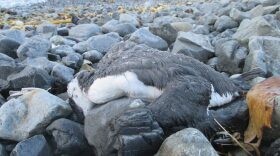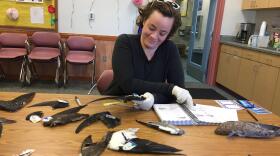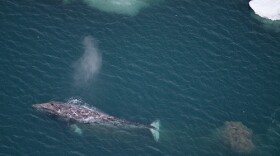-
When the last “Blob” hit the Pacific, an area of the ocean larger than Canada experienced surface ocean temperatures rise as much as 7 degrees, completely altering the marine ecosystem for more than two years. The result was havoc in the food chain.
-
Scientists have linked recent mass mortalities to above-normal water temperatures, which affect birds' food sources.
-
Thousands of dead seabirds washed up on Alaska's shores this summer, marking the state's fifth straight year of mass die-offs. Now the Coastal Observation and Seabird Survey team is training volunteers to monitor the trend.
-
According to the National Park Service, reports received by mid-August documented thousands of dead short-tailed shearwaters from Bristol Bay, and lower numbers of other types of birds, found deceased in the Northern Bering and Chukchi Seas. This marks the fifth year in a row Alaska has seen mass seabird mortality events.
-
The Northeast Pacific Marine Heatwave of 2019 has raised ocean surface temperatures by 2–3 degrees across a giant swath of water off the West Coast.
-
Over the course of several seasons, dead seabirds have been found on coastlines all over the Bering Strait region, most of them emaciated. Scientists don’t know why the birds are starving, and they say they don’t have enough information yet to determine a definitive link between these specific bird die-offs and toxins created by algal blooms.
-
Scientists aren't calling climate change or declining sea ice the smoking gun yet. But they’ve seen enough other events that have come along with Arctic warming, like sea bird die-offs, that they’re asking questions.
-
Since May, hundreds of dead and dying seabirds have been found across the northern Bering and southern Chukchi Seas. Listen now
-
Seabirds have once again been found washed up on beaches in Western Alaska. Listen now
-
For the third year in a row, seabirds are washing up dead along the coastline in Alaska. Hundreds of birds have been discovered along a stretch of the Bering Sea, on the Pribilof Islands and as far north as Deering.Listen now
Alaska Public Media © 2025. All rights reserved.
Play Live Radio
Next Up:
0:00
0:00
Available On Air Stations









